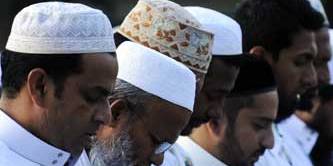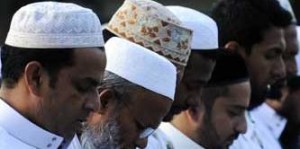Clarifications on Genocide by Izeth Hussain
I began my article “Genocidal anti-Muslim racism” in the Island of April 1 by remarking that the term “racism” had in recent times suddenly come into vogue, and that there is now recognition among the Sinhalese that there could be racists within their own ranks.
The obvious example is the BBS which is widely recognized as racist. I saw that recognition as a step or even a great leap forward holding out promise for the future. It might have seemed to many readers that I was being absurdly euphoric. I believe on the contrary that I am proceeding on a very sound principle. It is that to solve a problem you must first of all be able to recognize the problem. Formerly, it seemed to me, that very few Sinhalese were willing to recognize that at the root of our ethnic problems there was Sinhalese racism, or at least that that was part of the problem. Now, in connection with the BBS’s anti-Muslim campaign, there seems to be a widespread recognition that Sinhalese racism is in this case the real problem. That recognition could lead to more realistic thinking about our inter-ethnic relations.
The obvious example is the BBS which is widely recognized as racist. I saw that recognition as a step or even a great leap forward holding out promise for the future. It might have seemed to many readers that I was being absurdly euphoric. I believe on the contrary that I am proceeding on a very sound principle. It is that to solve a problem you must first of all be able to recognize the problem. Formerly, it seemed to me, that very few Sinhalese were willing to recognize that at the root of our ethnic problems there was Sinhalese racism, or at least that that was part of the problem. Now, in connection with the BBS’s anti-Muslim campaign, there seems to be a widespread recognition that Sinhalese racism is in this case the real problem. That recognition could lead to more realistic thinking about our inter-ethnic relations.
In any case the racism paradigm, as I have been arguing for some time, affords a much better grasp of what is involved in so-called ethnic problems than the ethnic paradigm. Racism is seen as coming from the drive to treat the Other as inferior. There are three recognized ways of doing that, one of which is to confine a targeted ethnic minority to inferior positions in a hierarchically ordered system. That was being done to our Tamils, in a systematic way, for decades. That was also being done to our Muslims in the State sector, as I can attest from personal first-hand experience as a Foreign Service officer. I have details to show beyond contest that the 1977 UNP Government practiced racist discrimination against Muslims in the foreign relations sector to an extent that was probably the worst in the world – all under a bizarre Muslim Foreign Minister who was used to legitimate that discrimination – a record that did not really surprise me as I have long regarded the UNP as a quintessentially anti-Muslim racist party, much more so than the SLFP.
The two other recognized ways of treating the Other as inferior is to exclude them or to subject them to genocide. Exclusion could take a mild form or be quite intolerable. For instance the Chinese in the Philippines are not welcome in the State sector nor do they want any significant place there, thriving as they do in the private sector where in fact they have more status than the Bhumiputra Filipinos who strut about in the State sector. I have long believed that that could be a model for inter-ethnic accommodation in Sri Lanka, but for the time being the Sinhalese racists seem to be adamantly averse to allowing their legitimate place to the minorities both in the State sector and the private sector. In a way, what has proved successful with the Chinese in the Philippines is a limited form of apartheid, quite successful and acceptable because it is founded on the ancient principle of an ethnic division of labour that is to be found all over the world. Systematic apartheid on an extended scale is of course the most intolerable form of exclusion. It came a cropper in South Africa and is bound to do so in Zionist Israel as well, no less than Kissinger forecasting that in ten years’ time there will be no more Israel.
Exclusion can sometimes slide into genocide. Sri Lanka provided a splendid example when the LTTE drove out a hundred thousand Muslims from the North, an act which has come to be regarded internationally as a horrendous act of genocide. We SL Muslims, however, have never committed genocide during the entirety of our existence in this island of over 1,400 years, for which I can give a convincing explanation: we lacked the means to do it. But we too have done our mite to show that we are solidary with our Sinhalese and Tamil brothers when it comes to the matter of genocide: at the height of the war Muslim Homeguards got together with the STF to drive out Tamils from around seventeen villages. It was certainly an act of exclusion with a genocidal touch to it. The most notorious act of genocide through exclusion in the last century was committed during the First World War by the Turks when they drove out their Armenian minority. It inspired what in my view is one of the great novels of the world, Franz Werfel’s The Forty Days of Musa Dagh. I must add that the Sinhalese are internationally recognized as having committed genocide of the conventional order in 1983.
I must now define what is meant by genocide. But before doing that I must provide a clarification. The drive to treat the Other as inferior is so widespread that it can be regarded as practically universal. It is a drive that can erupt anywhere under certain conditions, and it can take a genocidal form anywhere, including in the most civilized countries – such as in Nazi Germany. In fact genocide is a commonplace phenomenon in history.
The Kuveni legend points clearly to an act of genocide against the original inhabitants of a country, and so does the fact that a great many dominant majorities in the world are not indigenous to the territories where they are today bossing the show over the minorities. A realistic appraisal of the present situation in Sri Lanka requires our taking into account the possibility that the Sinhalese racists may want to commit genocide against the Muslims. Anyone who regards that idea as being insulting to the Sinhalese can be fairly regarded in one of three possible ways: he is a fool, he is an ignoramus, or he is both.
For the definition of genocide I turn to Pierre-Andre Taguieff’s book Racism. The term “genocide” was created by the jurist Raphael Lemkin in 1944, and it has come to be used in two ways. In a narrow technical sense, it is used to mean the systematic extermination, in accordance with an ideological conception, of a human group regarded as deserving it. In the second and wider sense, it is used to mean actions taken with the objective of destroying, wholly or in part, a racial, national, ethnic, religious or other group. The 1983 “riots” against the Tamils were clearly genocidal in the second sense.
The big question preoccupying many Sri Lankans is whether there will be another 1983, this time against the Muslims as had been anticipated by many Tamils and Muslims after the 1983 pogrom. It is assumed that in that event we will have another ethnic conflict on our hands. It is arguable that it was not anti-Tamil discrimination but the State terrorism after 1977, mounting to a genocidal crescendo in 1983, that ignited the Tamil armed rebellion. Likewise, in the case of the Muslims, mass violence against them could become the catalyst for armed rebellion.
It is difficult to imagine a more submissive – indeed abjectly submissive – minority than our Muslims. But changes are taking place, as suggested by the spectacular success of the Eastern Province hartal organized by Azath Sally and Mujibur Rahman. Reportedly that provoked the anger of the Sinhalese extremists, and some believe that the attack on Fashion Bug was their riposte meant to demonstrate Muslim vulnerability to the Sinhalese majority.
There are hard facts that seem to favor an anti-Muslim pogrom. Hardly anyone today doubts that the Government has been complicit with the BBS. The police blatantly play the role of spectators while anti-Muslim action is going on, and the Government takes no action against them. On the other hand, when Buddhist moderates engage in a peaceful candle-light vigil, the police immediately arrest them. Some conclusions might be drawn, rightly or wrongly: the Government wants no opposition to the Buddhist extremists, and as for the Muslims they are beneath and outside the Law, a people who should not expect the protection of the State when Buddhists target the Muslims. The reason for this position is of course that the Government’s power rests mainly on Buddhist support. It is a consideration that applies to all the other political parties as well, except for the minority ethnic parties. The Muslims can expect no meaningful support from the Opposition. Nor can they expect such support from the civil society, which is simply not dynamic enough for that purpose. As for the people, they need a scapegoat and the Muslim is the ideal candidate for that role as I argued in my last article.
In brief, everything points to a genocidal anti-Muslim pogrom which can be carried out with total impunity.
Fortunately President Rajapakse is obviously against that, and very probably there is an understanding with the BBS that the anti-Muslim program can proceed merrily but without violence. I believe that his reason for taking up that position is concern about possible foreign reactions. I must also say that I have come to suspect more and more strongly that behind the nonsense about halal and the anti-Muslim program sinister foreign forces have been at work.
courtesy – Sri Lanka Guardian

